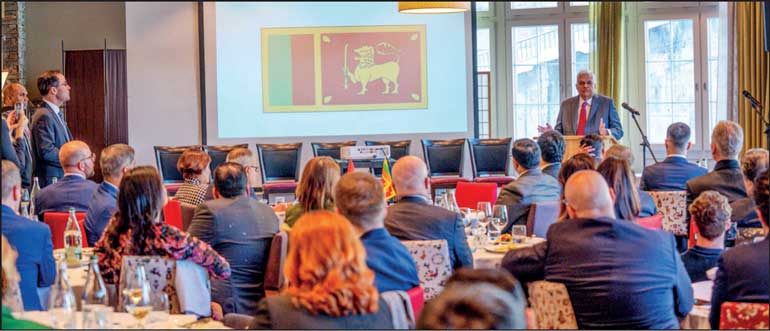Monday Feb 23, 2026
Monday Feb 23, 2026
Wednesday, 17 January 2024 00:00 - - {{hitsCtrl.values.hits}}

President Ranil Wickremesinghe who is attending the World Economic Forum in Davos, Switzerland, on Monday wooed fresh global foreign investment into Sri Lanka’s renewable energy given the future upside supported by progressive policies in place.
He extended the invitation to participants at the ‘Green Technology Forum’ organised by the Swiss-Asian Chamber of Commerce in collaboration with the Board of Investment of Sri Lanka on the side-lines of the World Economic Forum in Davis.
Wickremesinghe expressed confidence in its potential to yield substantial benefits for both stakeholders and consumers in the coming decades.
The President also assured that investors venturing into the sector can anticipate a comprehensive and unwavering policy framework in the realm of renewable energy.
Speaking on the theme of ‘Paving the way to an energy secure Sri Lanka,’ Wickremesinghe highlighted the substantial potential of Sri Lanka’s renewable energy sector.
He further outlined the Government’s initiatives over the past two years to establish an investment-friendly environment in the renewable energy sector.
Emphasising Sri Lanka’s dedication to addressing climate change, Wickremesinghe elaborated on various measures, including the ‘Tropical Belt Initiative,’ presented at the COP28 conference in Dubai.
He also highlighted Sri Lanka’s commitment to sustainable and green development, noting ambitious plans and determination to achieve net-zero emissions by 2050.
The President underscored the pivotal role of the rapid renewable energy plan, describing it as a key component of Sri Lanka’s comprehensive efforts towards sustainable development and a crucial step in ensuring energy security.
Wickremesinghe also spoke of the progress made by Sri Lanka in terms of governance and economic reforms.
“Following the major reforms implemented in the energy sector in the last two years, there has renewed interest in this sector. There are already large scale solar and wind power projects that have commenced implementation. A major Indian player has commenced implementation of a 350 MW wind power plant that is expected to be commissioned in 2025. The same player is considering a further $ 750 million investment in wind power,” the President told the forum in Davos.
“Wind power is a major opportunity for Sri Lanka,” he stressed, adding that a recent World Bank report indicated that off-shore wind power in particular has the potential to generate power far greater than Sri Lanka’s requirements.
He said that considering this, Sri Lanka and India are in advanced stages of talks regarding grid interconnection to enable Sri Lanka to export surplus electricity particularly to the fast growing industrial belt in the Southern part of India. There is also tremendous potential for the development of green hydrogen in Sri Lanka.
“Sri Lanka has ambitious plans to fulfil its sustainable, green development agenda. By 2050 the country has committed to achieving net zero. The accelerated renewable energy plan is a key component of this overall effort and is also an essential step on the path towards energy security. Renewable energy will also drive down costs of generation since at present Sri Lanka is compelled to rely on high cost heavy fuels during the dry season. Sri Lanka is in the process of establishing an international climate university, which will continue to unlock opportunities in green energy.
It is clear that Sri Lanka’s renewable energy policy direction is underpinned by multiple motivations and drivers. Therefore investors can expect a high degree of policy continuity in this sector going forward as well. This is the best time to invest in Sri Lanka’s renewable energy journey, and I have no doubt such investments will generate significant value for shareholders and Sri Lanka’s consumers over the next several decades.
Following the President’s address, Chief of Staff Sagala Ratnayake and BOI Chairman Dinesh Weerakkody participated in the panel discussions.